This isn’t just about food — it’s an act of quiet resistance. In Ukraine today, no one books a table weeks in advance; tomorrow is never promised. And sometimes, dinner simply ends mid-bite: the air-raid sirens rise in the distance, the carbonara still steaming on the plate, as everyone hurries down into the shelter below.
Other times, there are no alarms. But even without the sirens, time is short. Curfew falls at midnight, and every dinner becomes a quiet race against the clock. For many, a meal in a restaurant has become a gesture heavy with meaning — a fragile but necessary pause. A way to reclaim, if only for two hours, the illusion of normal life.
"In Ukraine today, no one books a table weeks in advance - tomorrow is never promised"
Anyone living in Kyiv, like me, knows this all too well. Morning can begin after a hard night: missile strikes, drones shot down, entire neighborhoods damaged. The acrid smell of fires from the overnight strikes hangs in the air, mingling with the aroma of coffee. The cafés open anyway. Even the ones hit by shockwaves, their windows blown out. In a scene that now feels almost routine, one young woman sweeps up shards of glass while another — a young barista — pulls espresso after espresso. The machine hums. And then comes that moment: the first sip of Lavazza. Something realigns. You’re alive. You breathe. You have another day ahead of you — and that’s not something you can take for granted.
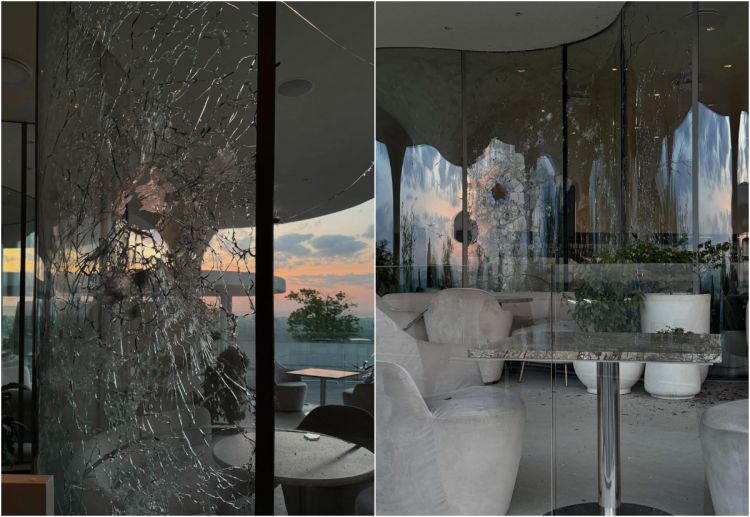
Elevato restaurant in Kyiv, damaged by a Russian drone strike…
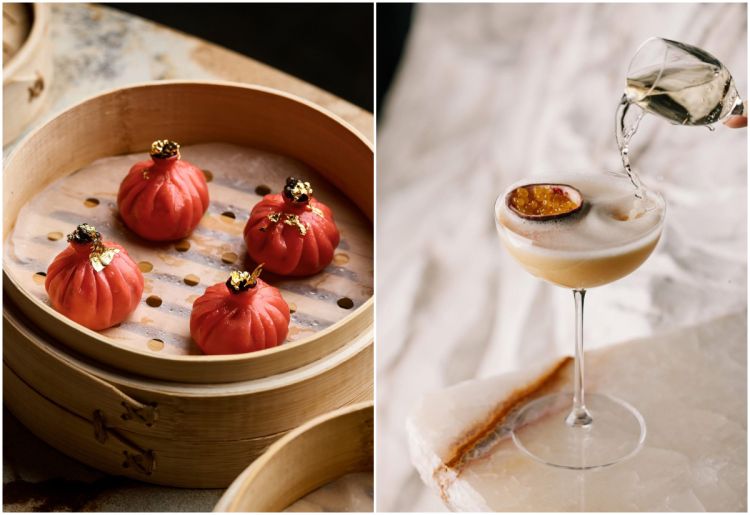
…yet the kitchen refused to stop. At Elevato, guests can still savor dishes like lobster dim sum topped with black caviar and gold leaf, and signature cocktails such as the Olympia. The restaurant is a contemporary, experimental culinary project in Kyiv, fusing Asian and European influences. It was born in the very midst of the war: opening in the city center in March of this year, only to be struck a few months later by shrapnel from a Russian kamikaze drone
That ‘one more day’ also comes for restaurants like
Elevato, in Pechersk, a central, residential district of Kyiv. A few weeks ago, fragments from a Russian drone scarred the façade and the blast wave blew out the windows. By that same afternoon, just hours later, the doors were open again. «We decided to open anyway - the owner told us - Out of respect for our guests — and for ourselves. Life goes on”. Dining here isn’t a luxury. It’s the stubborn belief that, despite everything.
Here, even a set table can become a target
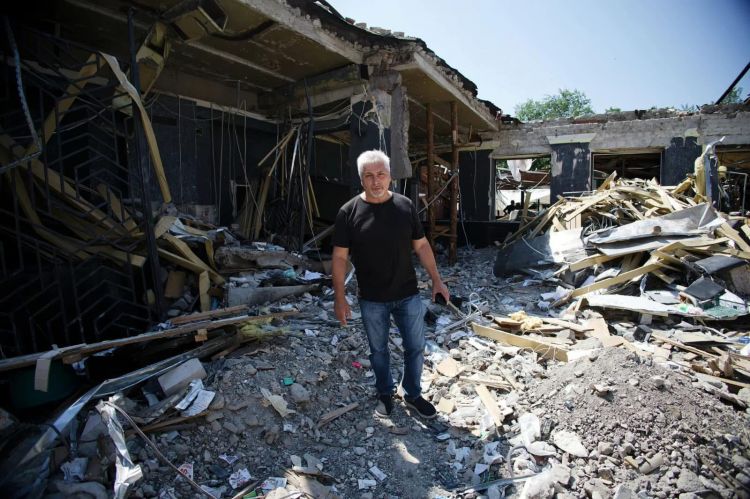
Yurii Gut, 66, owner of Ria Pizza, stands amid the rubble of his restaurant destroyed by Russian missiles. On June 27, 2023, a Russian Iskander ballistic missile struck Ria Pizza in Kramatorsk, in Ukraine’s Donetsk region. The attack killed 13 people, including four children, and injured 61 others, among them several journalists and an eight-month-old baby.
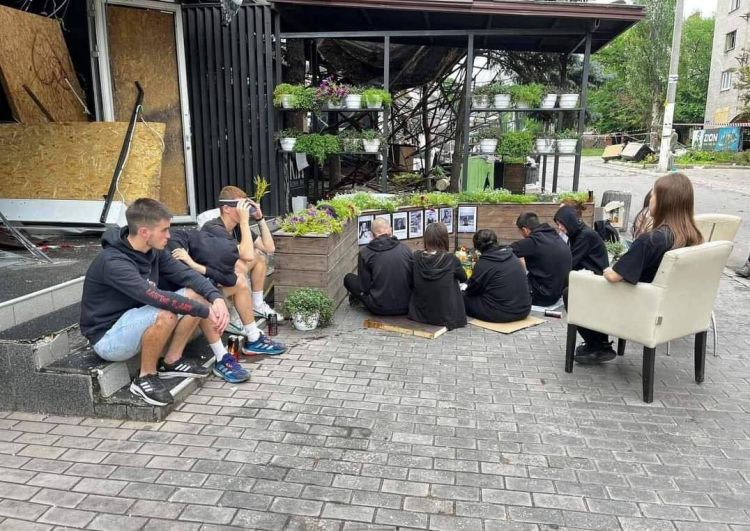
Ria Pizza’s surviving employees honor their colleagues who were killed
Nearly two thousand restaurants and cafés have been damaged or wiped off the map in Ukraine since the war began. Some will never reopen. Others are still defiantly full of life. But not
Ria Pizza, in Kramatorsk. On the evening of June 27, 2023, just after 7:30 p.m., the restaurant was heaving: every table inside and out was taken, the air heavy with summer heat and laughter. Then, a Russian Iskander missile slammed into the building. In an instant, the restaurant was reduced to rubble. Diners and staff were buried where they sat; many died instantly, others were pulled out gravely injured. The attack struck at the very core of a simple daily ritual—the act of sitting down to eat—that had once felt untouchable. Today,
Ria Pizza stands as a raw reminder of how fragile civilian life has become in Ukraine’s war.
And yet, across the country, in countless other kitchens, the stoves are still lit, the knives still chopping, the plates still leaving the pass. Life, however fragile, refuses to go dark.
«We’re not just cooking – we’re giving people an hour of normal life»
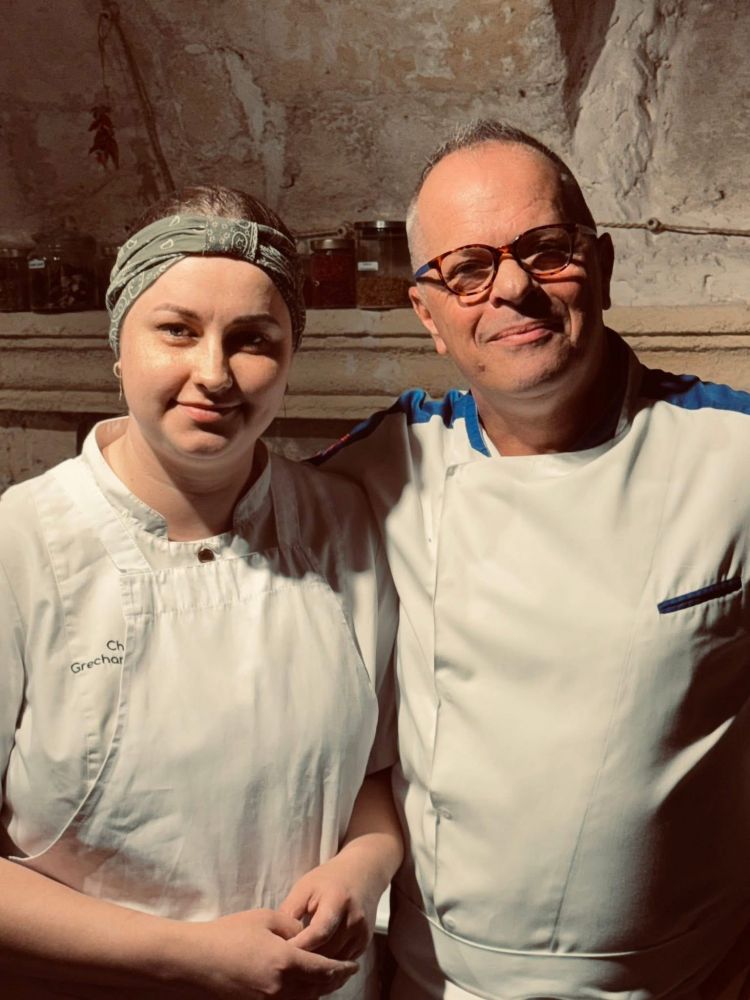
Roberto Armaroli from Bologna, owner of Antica Cantina in Odesa, with his chef Anna Grechana
In the heart of Odesa, beneath the wail of sirens and the drumbeat of constant attacks, there is a corner of Italy that endures under fire. It’s called
Antica Cantina, and at the helm is
Roberto Armaroli, a native of Bologna and an innkeeper by vocation. He opened the restaurant in 2019, inspired by the 18th-century wine cellars of Bologna and Florence. The underground dining room is essentially a bunker. «When I designed it, I only wanted to recreate the atmosphere of the old Emilian taverns - he says - I never imagined how precious it would become in wartime». Here, guests find a rare sense of calm—even though
Roberto sometimes has to insist they head downstairs during air-raid alerts. «I’m the one responsible, so I decide: I send them down for their safety», he says.
Odesa is one of the Ukrainian cities hardest hit by the war, a constant target for Russian drones and Iskander, Kalibr and Kinzhal missiles launched from the Black Sea fleet. Since 2022, more than 130 civilians have been killed and over 300 wounded in strikes that routinely batter the city’s port infrastructure. «At first it was a shock - Roberto admits - Then you adapt. People adapt to anything. Every morning I tell my staff: we’re doing more than cooking here—we’re giving exhausted people an hour of peace in the middle of a war».
All the food products—from flour to milk, from cured meats to Parmigiano—are all strictly imported from Italy. «They’re the hallmarks of our cuisine; they can’t be replaced», Roberto says. But some things have changed. «I had to take raw seafood off the menu. Too much uncertainty at customs, too many delays. On the upside, Ukrainian meats are excellent. But Italian Parmigiano… that’s irreplaceable». One of the most surprising discoveries of his life in Odesa isn’t Italian at all, but it speaks the same language of the soul: vareniki—triangular or crescent-shaped dumplings. «I love them, especially the ones with potatoes and mushrooms - he says - They remind me of the ravioli of my childhood, the ones I used to eat in Bologna with my grandmother. Even though they’re different in shape and dough, the idea is the same: a warm, soft pillow filled with flavor and memory. It’s the food of home and of peace».
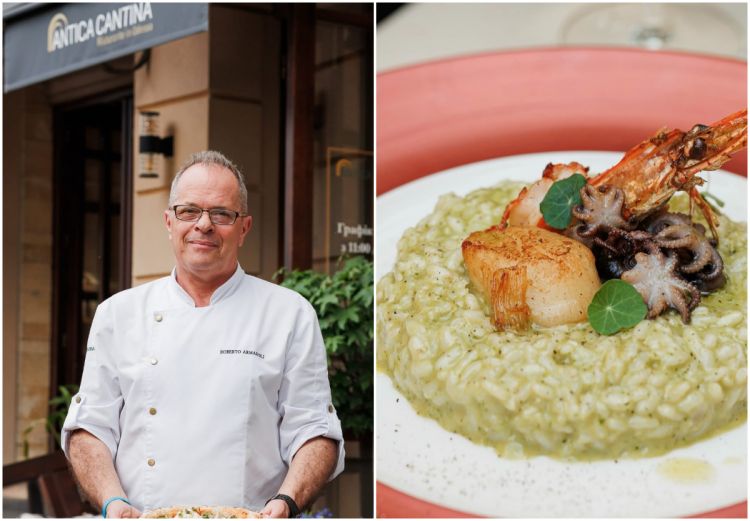
Armaroli with a risotto from Antica Cantina. We spoke to him a few days ago; the previous night had been brutal for Odesa — even the city’s historic Pryvoz market, where he usually sources peak-season fruit and vegetables, had been hit
Evenings at
Roberto’s often end with a simple, heartfelt gesture: a shot of his homemade
limoncello, offered to guests as both a farewell and a sign of gratitude. «It’s my way of saying: thank you for being here», he explains. At the start of the war, the restaurant was plunged into months of sheer survival. Six young women from his staff left immediately for the front lines; logistics ground to a halt, supplies stopped arriving, and the blackouts caused by Russian strikes on the power grid meant they could only work a few hours a day, from noon to 4 p.m. «It was no longer hospitality -
Armaroli recalls - It was resistance. I thought Covid had already brought us to rock bottom. But I was wrong». Today, after more than three years of war,
Antica Cantina is running at full strength. The restaurant now serves an average of 200 covers a day, with continuous service from 11 a.m. to 11 p.m.—just an hour before curfew. It’s not like in Italy, where diners linger at the table late into the night. Here, time has a different rhythm, marked by sirens and restrictions. But as long as they can, they cook. And they welcome people as they always have: with a smile and a warm plate of food.
A restaurant under fire, still dreaming of excellence
In Kyiv, in the very heart of the capital, there is
Beef—a steakhouse that has taken some of the war’s hardest hits and is still standing. In 2022, it ranked 76th on the international list The World’s 101 Best Steak Restaurants. In 2025, it still holds a place of honor at 79th. It’s a success story by any measure—yet one marked by deep scars. We spoke to its owner,
Ruslan Shybayev, on a video call just hours after a brutal night: dozens of drones and missiles had rained down on Kyiv, leaving eight people wounded. On screen, his face told the story—dark circles under his eyes, lines carved by exhaustion—but there was also the faintest smile. «After nights like that - he says - you still have to get up and work. We owe it to the people fighting for us. The day we chose to stay, we also chose to honor that decision».

Olexander Prokhorov, head sommelier at Beef, left to serve in Ukraine’s armed forces
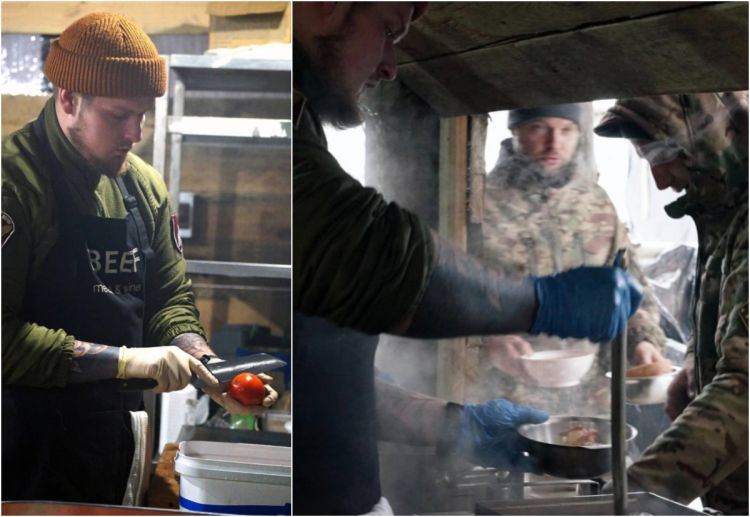
A former Beef cook now feeds his fellow soldiers at a military camp — still wearing his apron branded "Beef"
When Russia launched its full-scale invasion, nearly 40% of the staff had to leave: the men went to the front, the women abroad. The former chef-sommelier traded his white jacket for an army uniform and now operates drones on the front lines. Another cook, still wearing an old apron branded
Beef, is cooking for his fellow soldiers in a makeshift kitchen at a military camp. Yet
Beef’s menu remains a point of pride. At its heart is the
Ukrainian Beef Selection, using meat from local farms. «Our cattle breeders are meticulous -
Shybayev says - We work together on feeding techniques and health controls: no hormones, no antibiotics». The dominant breed is Belgian Blue, but the most ambitious project is the birth of a Ukrainian wagyu—born from crossbreeding a Holstein cow with a Japanese black bull. «Three heifers and five bulls were born in December - he says - We have to wait. But it will be a revelation».
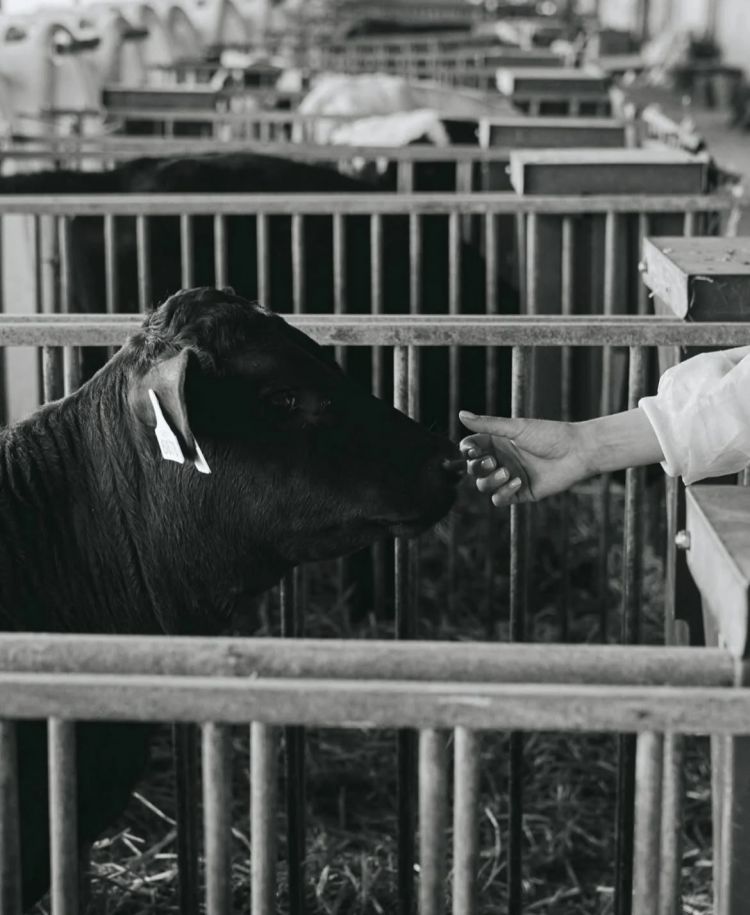
The farm that supplies Beef. Life goes on — even under the bombs
Alongside timeless international classics—beef tartare, St. Sever Label Rouge foie gras, silky veal cheek consommé, free-range duck breast, New Zealand lamb rack, and grilled asparagus with tiger nuts—the menu also celebrates Ukraine’s own culinary heritage: the unique flavors of potatoes, tomatoes and cucumbers. And then there’s breakfast, which in Ukraine is a ritual in itself. Together with chef
Olga Martynovska, a judge on
MasterChef Ukraine, a morning menu was created around a dish that defines the country’s culinary identity: buckwheat porridge. A simple, nourishing base that speaks to the soul of the nation. Served with braised meat or organic sausage, it’s a dish you’ll only find here..
"Between air-raid alerts, after sleepless nights and grueling shifts, the staff step back into the dining room. The chef ties on his apron. And the kitchen starts again"
Beef is not just about food; it’s about solidarity. The team recently raised €8,300 to buy a pickup truck for Ukrainian troops in the Bakhmut area. «It was needed to evacuate the wounded from the field. Down there, they had nothing», Shybayev explains. They also prepare food rations for soldiers at the front. «Everyone fights in their own way». Between air-raid alerts, after sleepless nights and punishing shifts, the staff step back into the dining room. The chef ties on his apron. And the kitchen begins again.
This is how, even under the bombs, Ukrainians still say Smachnogo! — bon appétit.